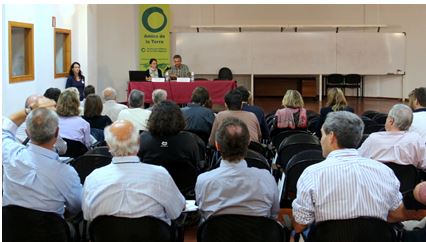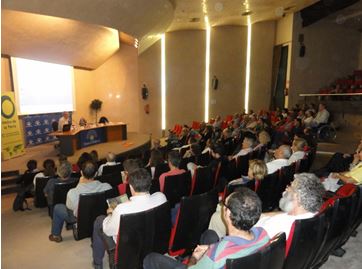
Travelling in Spain means passing through a diversity of cultures and different realities, but even so there is something fairly common to all: the impoverishment of citizens and their food sovereignty in favor of consumerism and mass tourism. Majorca is a clear example, where the territory’s economy is based on sun and beach tourism, which means tripling or quadrupling the resources in summer to cater for the temporary “immigrant” population.
Even though all territories should be able to ensure their own food sovereignty and aim for more self-management, in the case of islands the necessity is even greater. The island of Majorca is completely dependent on the import of food and other primary and secondary resources. The need to enhance farmland, and promote what could be called ‘short-haul consumption’, local trade and the relationship between the farmer and the consumer is increasingly important. For this reason, within the European project “Making the CAP work for Society and the Environment”, Friends of the Earth Spain has analyzed the current agricultural situation in different territories of Majorca.
What are the main challenges facing Majorcan agriculture? What alternatives will make its recovery viable?
When the questions and answers around a complex issue require a broad debate, it is interesting to generate different encounters where one can listen, debate and reflect. With this in mind, in Majorca three very different events were organised under the banner “21st century agriculture in Majorca: challenges and alternatives”:
- A technical conference in the University of the Balearic Islands (UIB) where 5 experts of various disciplines made presentations followed by a debate
- An open public meeting in the Club Diario de Mallorca, where a conference was given titled “Food revolt”: Return to the field”
- A visit to the farm of Son Cós, a large Majorcan estate where they breed livestock and almonds and carobs are cultivated amongst other products.
The conference at the UIB managed to capture a broad view of the agricultural conflict of our century, where we buy food without knowing where it comes from, or how it has been produced. This is a conflict where the farmer does not get paid what she or he deserves, and the consumer pays more than the product is worth, in which climate change is changing the crop’s calendar and affecting traditional crops. and international policies are created to try to alleviate the general problems but which do not solve the realities.
Thus expert speakers on climate change, modern agricultural methods, the Common Agricultural Policy (CAP), Rural Development Plans and local managers talked about GMOs, the change in the water balance, the consumption society, the European Common Agricultural Policy and the current situation in Majorca, with its insularity problem and the options for the future.

In the open public meeting we heard Gustavo Duch in the conference “Food revolt: return to the field”, which gave an overview of the current agricultural situation, where every day more farmers are disappearing and large multinationals abuse the rights of those who cultivate and enrich themselves at the expense of society. In the round table of experiences that followed, two cases were presented of agricultural initiatives in Majorca which are working very well and are clear examples of adaptation to 21st century agriculture. A Majorcan farmer related his experience from planting to the sale of organic products. A project called “Network M” in which a land-bank and community orchards have been developed was presented by its creator. The two initiatives are working very well because they are based on sharing tools and understanding necessities.

And so not only to stay with the theory, what better to visit than a typical Majorcan estate, where traditional crops of almonds, carob and olive trees are maintained. Xisco, the local farmer, showed us different varieties of almonds and explained how climate change is affecting the flowering of the trees – how they even flower twice a year. This has led to a significant decrease in production, meaning there are difficulties in keeping the farm profitable, and so Xisco’s farm is now opening to visitors to generate other complementary income in order to secure its viability.
For the future of agriculture in Majorca, the challenges are numerous, but so too are the alternatives. The first thing is to free ourselves from the fear of change and to be aware that our actions imply being part of the alternative. We consumers can do a lot to promote local agriculture, preserve agricultural landscapes and farmers’ quality of life. The most important thing, which is also relatively easy to do, is to become conscious consumers. This means purchasing responsibly, and where possible buying local, seasonal food – in particular directly from farmers markets or selling points.
This report was contributed by Friends of the Earth Spain.

Be the first to comment